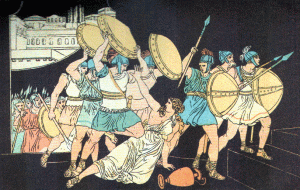
Multa diuque tuli; vitiis patientia victa est;
cede fatigato pectore, turpis amor!
scilicet adserui iam me fugique catenas,
et quae non puduit ferre, tulisse pudet.
vicimus et domitum pedibus calcamus amorem;
venerunt capiti cornua sera meo.
perfer et obdura! dolor hic tibi proderit olim;
saepe tulit lassis sucus amarus opem.
ergo ego sustinui, foribus tam saepe repulsus,
ingenuum dura ponere corpus humo?
ergo ego nescio cui, quem tu conplexa tenebas,
excubui clausam servus ut ante domum?
vidi, cum foribus lassus prodiret amator,
invalidum referens emeritumque latus;
hoc tamen est levius, quam quod sum visus ab illo—
eveniat nostris hostibus ille pudor!
quando ego non fixus lateri patienter adhaesi,
ipse tuus custos, ipse vir, ipse comes?
scilicet et populo per me comitata placebas;
causa fuit multis noster amoris amor.
turpia quid referam vanae mendacia linguae
et periuratos in mea damna deos?
quid iuvenum tacitos inter convivia nutus
verbaque conpositis dissimulata notis?
dicta erat aegra mihi—praeceps amensque cucurri;
veni, et rivali non erat aegra meo!
his et quae taceo duravi saepe ferendis;
quaere alium pro me, qui queat ista pati.
iam mea votiva puppis redimita corona
lenta tumescentes aequoris audit aquas.
desine blanditias et verba, potentia quondam,
perdere—non ego nunc stultus, ut ante fui!
(Ovid, Am. 3.11a)
I’ve endured too much, too long: my patience is defeated
by her offences: heart dead with weariness, vile love!
There’s no doubt I’m free now and have slipped my chain,
and what I wasn’t ashamed to bear, I’m ashamed I bore.
I’ve won and love is tamed, trampled under my feet:
at last true horns have appeared on my head.
Endure it and stand firm! This pain in the end will help you:
often bitter medicine brings strength to the weary.
So why did I endure it, so often shut out from your gate,
laying my delicate body on the hard floor?
So why did I keep watch, for him you held in your arms,
like a slave outside your closed door?
I saw, when your lover appeared weary, at your door,
found wanting, and his body all exhausted:
but it’s still worse that I was seen by him—
let that shame happen to my enemies!
When did I not cling patiently to your side,
your true guardian, your lover, friend?
And of course you pleased people through my friendship:
my love was the reason for your many lovers.
What, shall I say now, of your vile lies, your idle tongue,
and the gods perjured to harm me?
What of the silent nods of youths at parties,
and the deceptive words of secret messages?
They told me she’s ill—I ran, in a hurry, a madman:
I arrived, and she wasn’t too ill for my rival!
I’m hardened by this: by things unsaid I’ve often suffered:
find someone instead of me, who can endure it.
Now my vessel’s crowned with votive wreaths
calmly braving the ocean’s swelling waves.
Leave off your flatteries and your once powerful words,
forget them—now I’m not the fool I used to be!
(tr. Tony Kline)









